Corporate Law Assignment: Directors' Duties and Insolvent Trading
VerifiedAdded on 2023/03/17
|11
|2976
|78
Report
AI Summary
This report analyzes key aspects of Australian corporate law, focusing on the duties of company directors as outlined in the Corporations Act 2001. It examines fiduciary duties, statutory duties, and the distinctions between them. The assignment explores the concept of insolvent trading, including directors' liabilities and available defenses such as the safe harbor provision. It differentiates between the safe harbor principle (section 588GA) and the business judgment rule (section 180(2)). The report also includes a case study analysis of a finance scam, evaluating the breach of directors' duties by the executive director and the potential liabilities of other directors involved. The report covers the responsibilities of directors, the consequences of breaching their duties, and the importance of disclosure and proper financial management. The report concludes by highlighting the importance of directors to act in good faith and exercise their powers and authorities for performing their duties with adequate care and meticulousness.
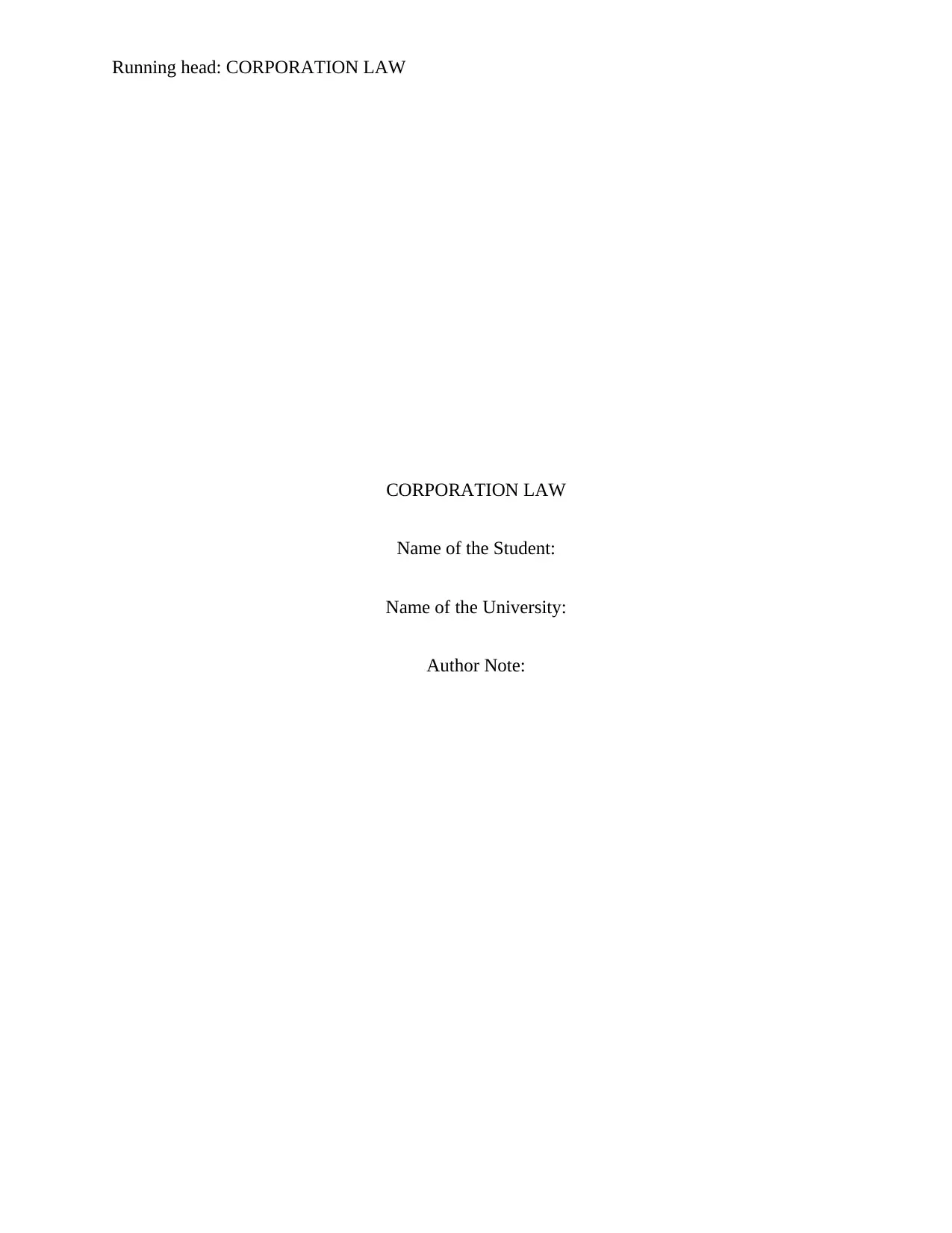
Running head: CORPORATION LAW
CORPORATION LAW
Name of the Student:
Name of the University:
Author Note:
CORPORATION LAW
Name of the Student:
Name of the University:
Author Note:
Paraphrase This Document
Need a fresh take? Get an instant paraphrase of this document with our AI Paraphraser
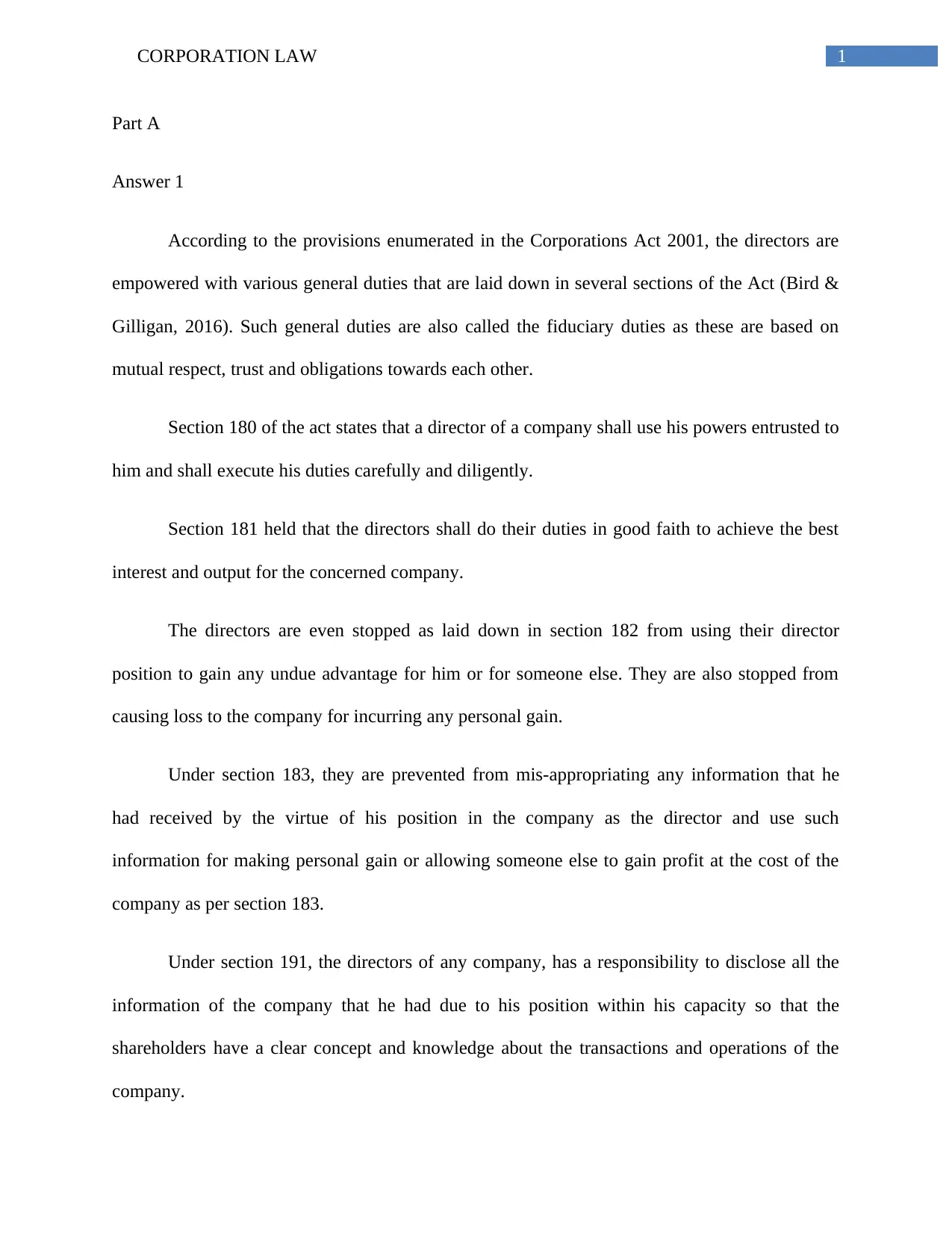
1CORPORATION LAW
Part A
Answer 1
According to the provisions enumerated in the Corporations Act 2001, the directors are
empowered with various general duties that are laid down in several sections of the Act (Bird &
Gilligan, 2016). Such general duties are also called the fiduciary duties as these are based on
mutual respect, trust and obligations towards each other.
Section 180 of the act states that a director of a company shall use his powers entrusted to
him and shall execute his duties carefully and diligently.
Section 181 held that the directors shall do their duties in good faith to achieve the best
interest and output for the concerned company.
The directors are even stopped as laid down in section 182 from using their director
position to gain any undue advantage for him or for someone else. They are also stopped from
causing loss to the company for incurring any personal gain.
Under section 183, they are prevented from mis-appropriating any information that he
had received by the virtue of his position in the company as the director and use such
information for making personal gain or allowing someone else to gain profit at the cost of the
company as per section 183.
Under section 191, the directors of any company, has a responsibility to disclose all the
information of the company that he had due to his position within his capacity so that the
shareholders have a clear concept and knowledge about the transactions and operations of the
company.
Part A
Answer 1
According to the provisions enumerated in the Corporations Act 2001, the directors are
empowered with various general duties that are laid down in several sections of the Act (Bird &
Gilligan, 2016). Such general duties are also called the fiduciary duties as these are based on
mutual respect, trust and obligations towards each other.
Section 180 of the act states that a director of a company shall use his powers entrusted to
him and shall execute his duties carefully and diligently.
Section 181 held that the directors shall do their duties in good faith to achieve the best
interest and output for the concerned company.
The directors are even stopped as laid down in section 182 from using their director
position to gain any undue advantage for him or for someone else. They are also stopped from
causing loss to the company for incurring any personal gain.
Under section 183, they are prevented from mis-appropriating any information that he
had received by the virtue of his position in the company as the director and use such
information for making personal gain or allowing someone else to gain profit at the cost of the
company as per section 183.
Under section 191, the directors of any company, has a responsibility to disclose all the
information of the company that he had due to his position within his capacity so that the
shareholders have a clear concept and knowledge about the transactions and operations of the
company.
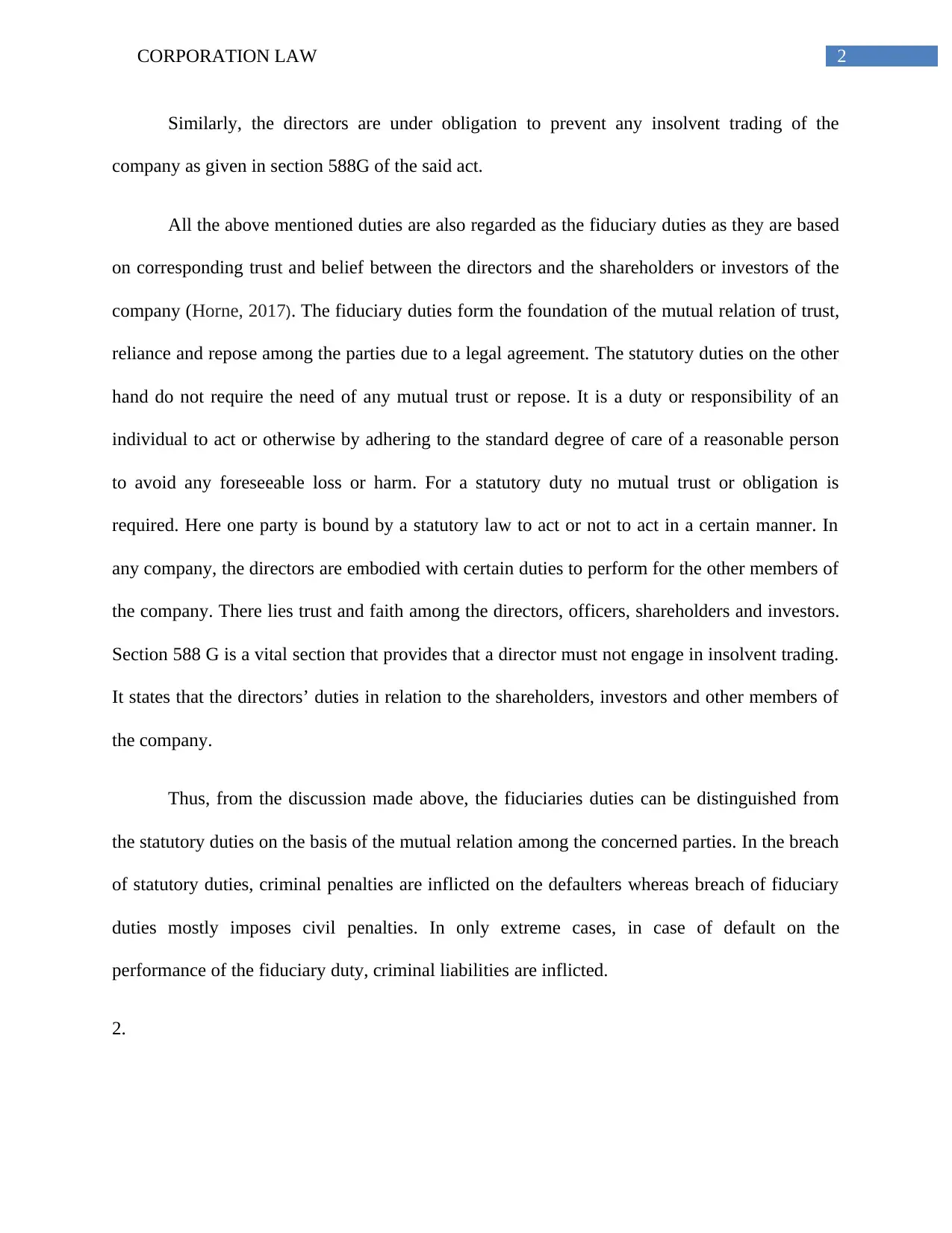
2CORPORATION LAW
Similarly, the directors are under obligation to prevent any insolvent trading of the
company as given in section 588G of the said act.
All the above mentioned duties are also regarded as the fiduciary duties as they are based
on corresponding trust and belief between the directors and the shareholders or investors of the
company (Horne, 2017). The fiduciary duties form the foundation of the mutual relation of trust,
reliance and repose among the parties due to a legal agreement. The statutory duties on the other
hand do not require the need of any mutual trust or repose. It is a duty or responsibility of an
individual to act or otherwise by adhering to the standard degree of care of a reasonable person
to avoid any foreseeable loss or harm. For a statutory duty no mutual trust or obligation is
required. Here one party is bound by a statutory law to act or not to act in a certain manner. In
any company, the directors are embodied with certain duties to perform for the other members of
the company. There lies trust and faith among the directors, officers, shareholders and investors.
Section 588 G is a vital section that provides that a director must not engage in insolvent trading.
It states that the directors’ duties in relation to the shareholders, investors and other members of
the company.
Thus, from the discussion made above, the fiduciaries duties can be distinguished from
the statutory duties on the basis of the mutual relation among the concerned parties. In the breach
of statutory duties, criminal penalties are inflicted on the defaulters whereas breach of fiduciary
duties mostly imposes civil penalties. In only extreme cases, in case of default on the
performance of the fiduciary duty, criminal liabilities are inflicted.
2.
Similarly, the directors are under obligation to prevent any insolvent trading of the
company as given in section 588G of the said act.
All the above mentioned duties are also regarded as the fiduciary duties as they are based
on corresponding trust and belief between the directors and the shareholders or investors of the
company (Horne, 2017). The fiduciary duties form the foundation of the mutual relation of trust,
reliance and repose among the parties due to a legal agreement. The statutory duties on the other
hand do not require the need of any mutual trust or repose. It is a duty or responsibility of an
individual to act or otherwise by adhering to the standard degree of care of a reasonable person
to avoid any foreseeable loss or harm. For a statutory duty no mutual trust or obligation is
required. Here one party is bound by a statutory law to act or not to act in a certain manner. In
any company, the directors are embodied with certain duties to perform for the other members of
the company. There lies trust and faith among the directors, officers, shareholders and investors.
Section 588 G is a vital section that provides that a director must not engage in insolvent trading.
It states that the directors’ duties in relation to the shareholders, investors and other members of
the company.
Thus, from the discussion made above, the fiduciaries duties can be distinguished from
the statutory duties on the basis of the mutual relation among the concerned parties. In the breach
of statutory duties, criminal penalties are inflicted on the defaulters whereas breach of fiduciary
duties mostly imposes civil penalties. In only extreme cases, in case of default on the
performance of the fiduciary duty, criminal liabilities are inflicted.
2.
⊘ This is a preview!⊘
Do you want full access?
Subscribe today to unlock all pages.

Trusted by 1+ million students worldwide
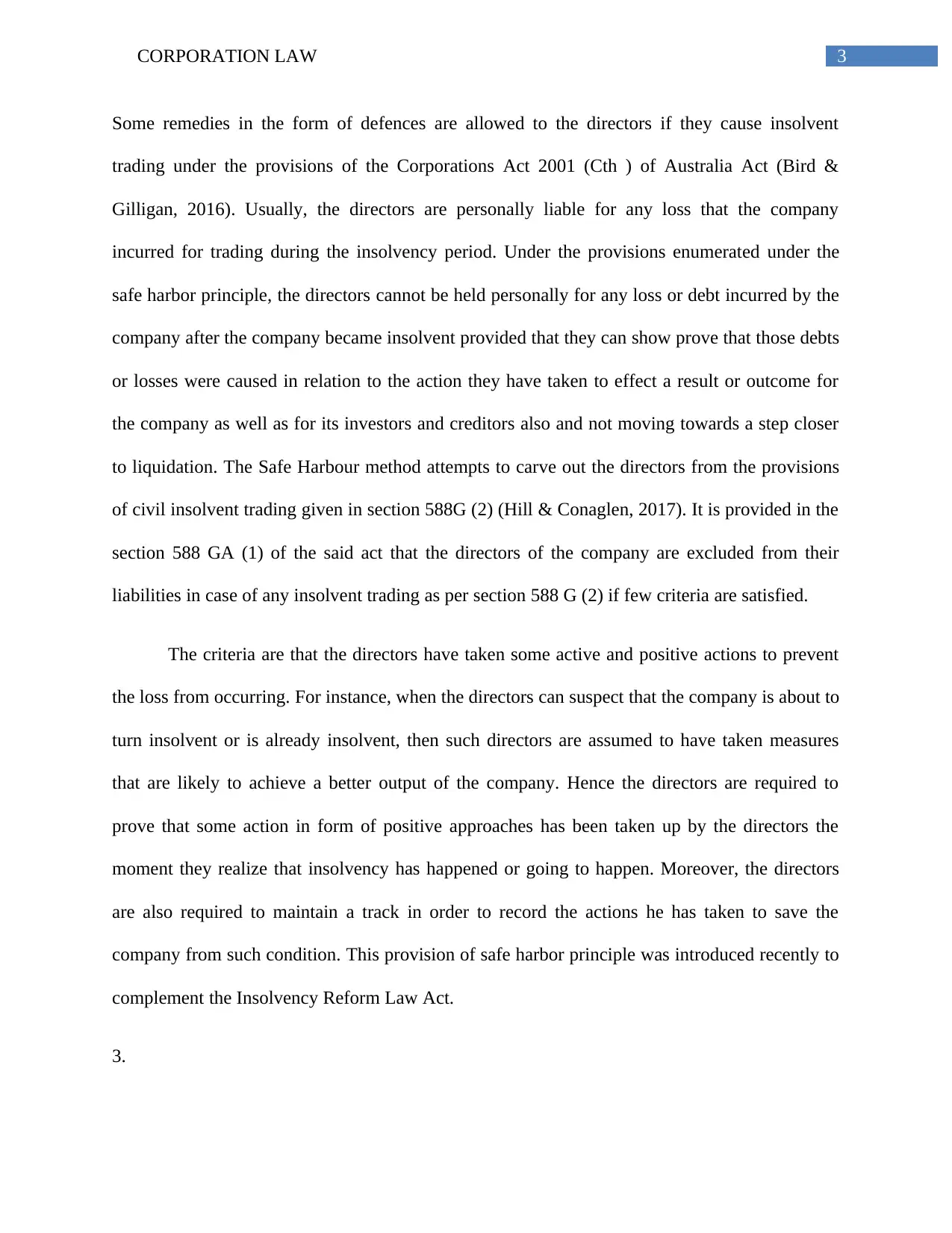
3CORPORATION LAW
Some remedies in the form of defences are allowed to the directors if they cause insolvent
trading under the provisions of the Corporations Act 2001 (Cth ) of Australia Act (Bird &
Gilligan, 2016). Usually, the directors are personally liable for any loss that the company
incurred for trading during the insolvency period. Under the provisions enumerated under the
safe harbor principle, the directors cannot be held personally for any loss or debt incurred by the
company after the company became insolvent provided that they can show prove that those debts
or losses were caused in relation to the action they have taken to effect a result or outcome for
the company as well as for its investors and creditors also and not moving towards a step closer
to liquidation. The Safe Harbour method attempts to carve out the directors from the provisions
of civil insolvent trading given in section 588G (2) (Hill & Conaglen, 2017). It is provided in the
section 588 GA (1) of the said act that the directors of the company are excluded from their
liabilities in case of any insolvent trading as per section 588 G (2) if few criteria are satisfied.
The criteria are that the directors have taken some active and positive actions to prevent
the loss from occurring. For instance, when the directors can suspect that the company is about to
turn insolvent or is already insolvent, then such directors are assumed to have taken measures
that are likely to achieve a better output of the company. Hence the directors are required to
prove that some action in form of positive approaches has been taken up by the directors the
moment they realize that insolvency has happened or going to happen. Moreover, the directors
are also required to maintain a track in order to record the actions he has taken to save the
company from such condition. This provision of safe harbor principle was introduced recently to
complement the Insolvency Reform Law Act.
3.
Some remedies in the form of defences are allowed to the directors if they cause insolvent
trading under the provisions of the Corporations Act 2001 (Cth ) of Australia Act (Bird &
Gilligan, 2016). Usually, the directors are personally liable for any loss that the company
incurred for trading during the insolvency period. Under the provisions enumerated under the
safe harbor principle, the directors cannot be held personally for any loss or debt incurred by the
company after the company became insolvent provided that they can show prove that those debts
or losses were caused in relation to the action they have taken to effect a result or outcome for
the company as well as for its investors and creditors also and not moving towards a step closer
to liquidation. The Safe Harbour method attempts to carve out the directors from the provisions
of civil insolvent trading given in section 588G (2) (Hill & Conaglen, 2017). It is provided in the
section 588 GA (1) of the said act that the directors of the company are excluded from their
liabilities in case of any insolvent trading as per section 588 G (2) if few criteria are satisfied.
The criteria are that the directors have taken some active and positive actions to prevent
the loss from occurring. For instance, when the directors can suspect that the company is about to
turn insolvent or is already insolvent, then such directors are assumed to have taken measures
that are likely to achieve a better output of the company. Hence the directors are required to
prove that some action in form of positive approaches has been taken up by the directors the
moment they realize that insolvency has happened or going to happen. Moreover, the directors
are also required to maintain a track in order to record the actions he has taken to save the
company from such condition. This provision of safe harbor principle was introduced recently to
complement the Insolvency Reform Law Act.
3.
Paraphrase This Document
Need a fresh take? Get an instant paraphrase of this document with our AI Paraphraser
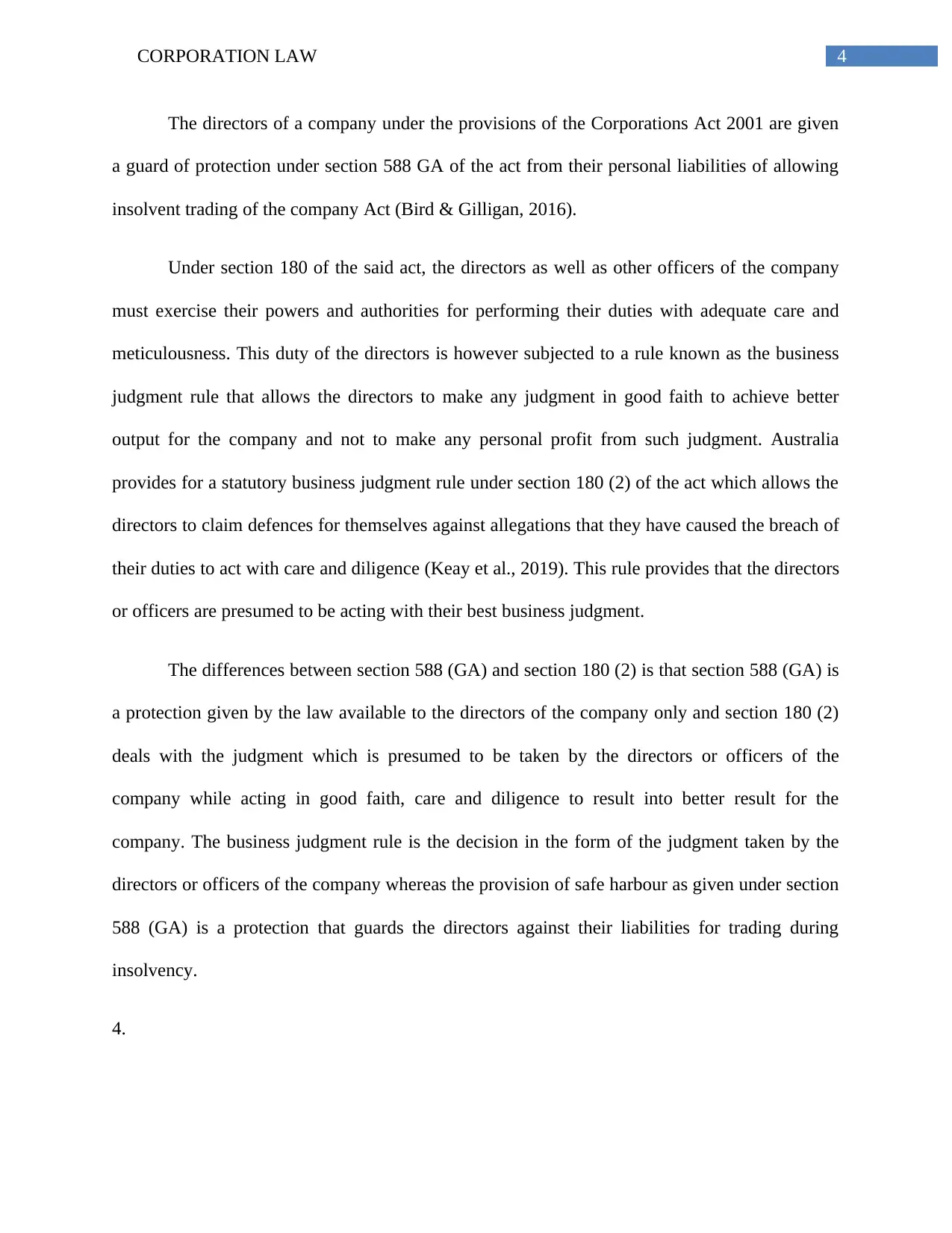
4CORPORATION LAW
The directors of a company under the provisions of the Corporations Act 2001 are given
a guard of protection under section 588 GA of the act from their personal liabilities of allowing
insolvent trading of the company Act (Bird & Gilligan, 2016).
Under section 180 of the said act, the directors as well as other officers of the company
must exercise their powers and authorities for performing their duties with adequate care and
meticulousness. This duty of the directors is however subjected to a rule known as the business
judgment rule that allows the directors to make any judgment in good faith to achieve better
output for the company and not to make any personal profit from such judgment. Australia
provides for a statutory business judgment rule under section 180 (2) of the act which allows the
directors to claim defences for themselves against allegations that they have caused the breach of
their duties to act with care and diligence (Keay et al., 2019). This rule provides that the directors
or officers are presumed to be acting with their best business judgment.
The differences between section 588 (GA) and section 180 (2) is that section 588 (GA) is
a protection given by the law available to the directors of the company only and section 180 (2)
deals with the judgment which is presumed to be taken by the directors or officers of the
company while acting in good faith, care and diligence to result into better result for the
company. The business judgment rule is the decision in the form of the judgment taken by the
directors or officers of the company whereas the provision of safe harbour as given under section
588 (GA) is a protection that guards the directors against their liabilities for trading during
insolvency.
4.
The directors of a company under the provisions of the Corporations Act 2001 are given
a guard of protection under section 588 GA of the act from their personal liabilities of allowing
insolvent trading of the company Act (Bird & Gilligan, 2016).
Under section 180 of the said act, the directors as well as other officers of the company
must exercise their powers and authorities for performing their duties with adequate care and
meticulousness. This duty of the directors is however subjected to a rule known as the business
judgment rule that allows the directors to make any judgment in good faith to achieve better
output for the company and not to make any personal profit from such judgment. Australia
provides for a statutory business judgment rule under section 180 (2) of the act which allows the
directors to claim defences for themselves against allegations that they have caused the breach of
their duties to act with care and diligence (Keay et al., 2019). This rule provides that the directors
or officers are presumed to be acting with their best business judgment.
The differences between section 588 (GA) and section 180 (2) is that section 588 (GA) is
a protection given by the law available to the directors of the company only and section 180 (2)
deals with the judgment which is presumed to be taken by the directors or officers of the
company while acting in good faith, care and diligence to result into better result for the
company. The business judgment rule is the decision in the form of the judgment taken by the
directors or officers of the company whereas the provision of safe harbour as given under section
588 (GA) is a protection that guards the directors against their liabilities for trading during
insolvency.
4.
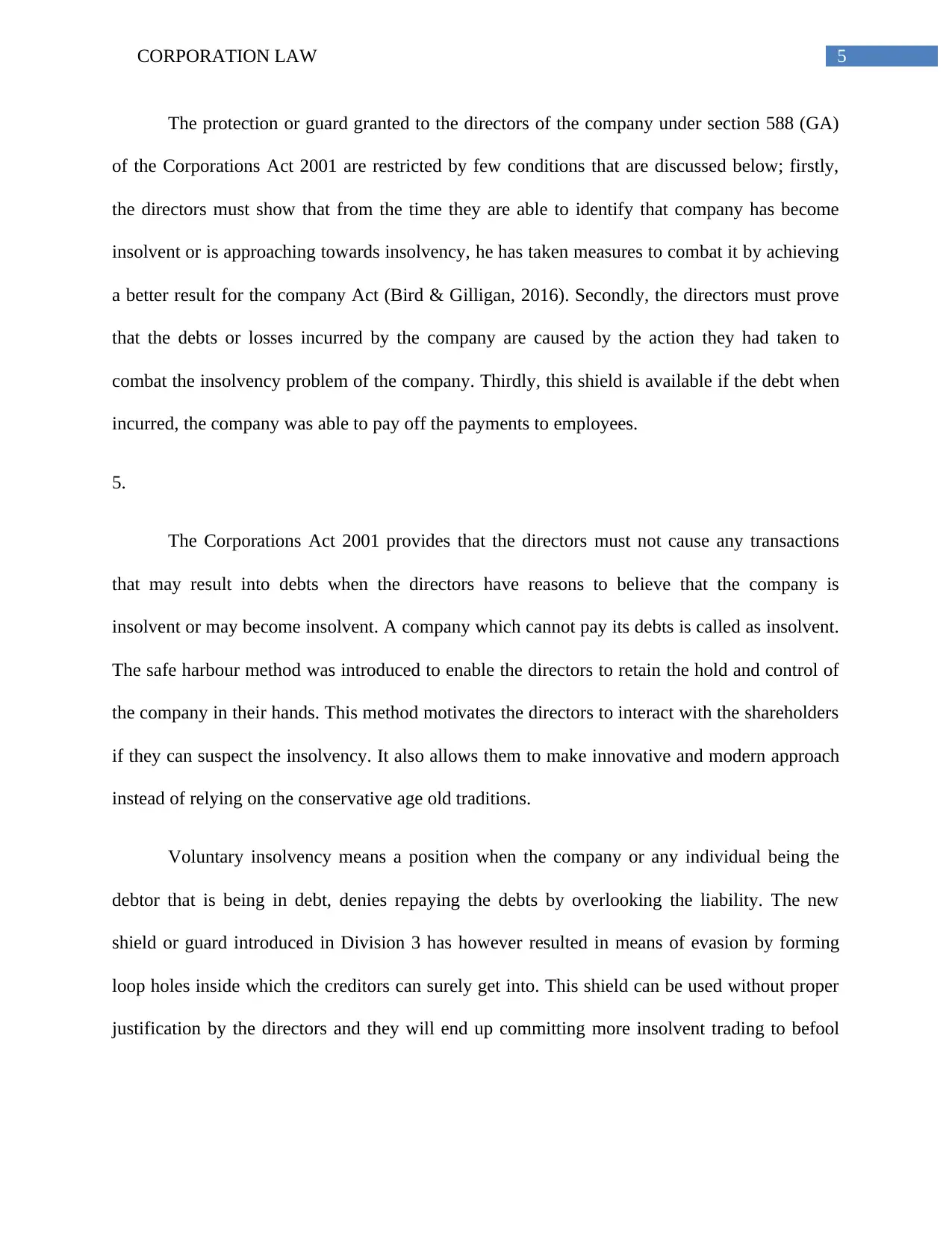
5CORPORATION LAW
The protection or guard granted to the directors of the company under section 588 (GA)
of the Corporations Act 2001 are restricted by few conditions that are discussed below; firstly,
the directors must show that from the time they are able to identify that company has become
insolvent or is approaching towards insolvency, he has taken measures to combat it by achieving
a better result for the company Act (Bird & Gilligan, 2016). Secondly, the directors must prove
that the debts or losses incurred by the company are caused by the action they had taken to
combat the insolvency problem of the company. Thirdly, this shield is available if the debt when
incurred, the company was able to pay off the payments to employees.
5.
The Corporations Act 2001 provides that the directors must not cause any transactions
that may result into debts when the directors have reasons to believe that the company is
insolvent or may become insolvent. A company which cannot pay its debts is called as insolvent.
The safe harbour method was introduced to enable the directors to retain the hold and control of
the company in their hands. This method motivates the directors to interact with the shareholders
if they can suspect the insolvency. It also allows them to make innovative and modern approach
instead of relying on the conservative age old traditions.
Voluntary insolvency means a position when the company or any individual being the
debtor that is being in debt, denies repaying the debts by overlooking the liability. The new
shield or guard introduced in Division 3 has however resulted in means of evasion by forming
loop holes inside which the creditors can surely get into. This shield can be used without proper
justification by the directors and they will end up committing more insolvent trading to befool
The protection or guard granted to the directors of the company under section 588 (GA)
of the Corporations Act 2001 are restricted by few conditions that are discussed below; firstly,
the directors must show that from the time they are able to identify that company has become
insolvent or is approaching towards insolvency, he has taken measures to combat it by achieving
a better result for the company Act (Bird & Gilligan, 2016). Secondly, the directors must prove
that the debts or losses incurred by the company are caused by the action they had taken to
combat the insolvency problem of the company. Thirdly, this shield is available if the debt when
incurred, the company was able to pay off the payments to employees.
5.
The Corporations Act 2001 provides that the directors must not cause any transactions
that may result into debts when the directors have reasons to believe that the company is
insolvent or may become insolvent. A company which cannot pay its debts is called as insolvent.
The safe harbour method was introduced to enable the directors to retain the hold and control of
the company in their hands. This method motivates the directors to interact with the shareholders
if they can suspect the insolvency. It also allows them to make innovative and modern approach
instead of relying on the conservative age old traditions.
Voluntary insolvency means a position when the company or any individual being the
debtor that is being in debt, denies repaying the debts by overlooking the liability. The new
shield or guard introduced in Division 3 has however resulted in means of evasion by forming
loop holes inside which the creditors can surely get into. This shield can be used without proper
justification by the directors and they will end up committing more insolvent trading to befool
⊘ This is a preview!⊘
Do you want full access?
Subscribe today to unlock all pages.

Trusted by 1+ million students worldwide
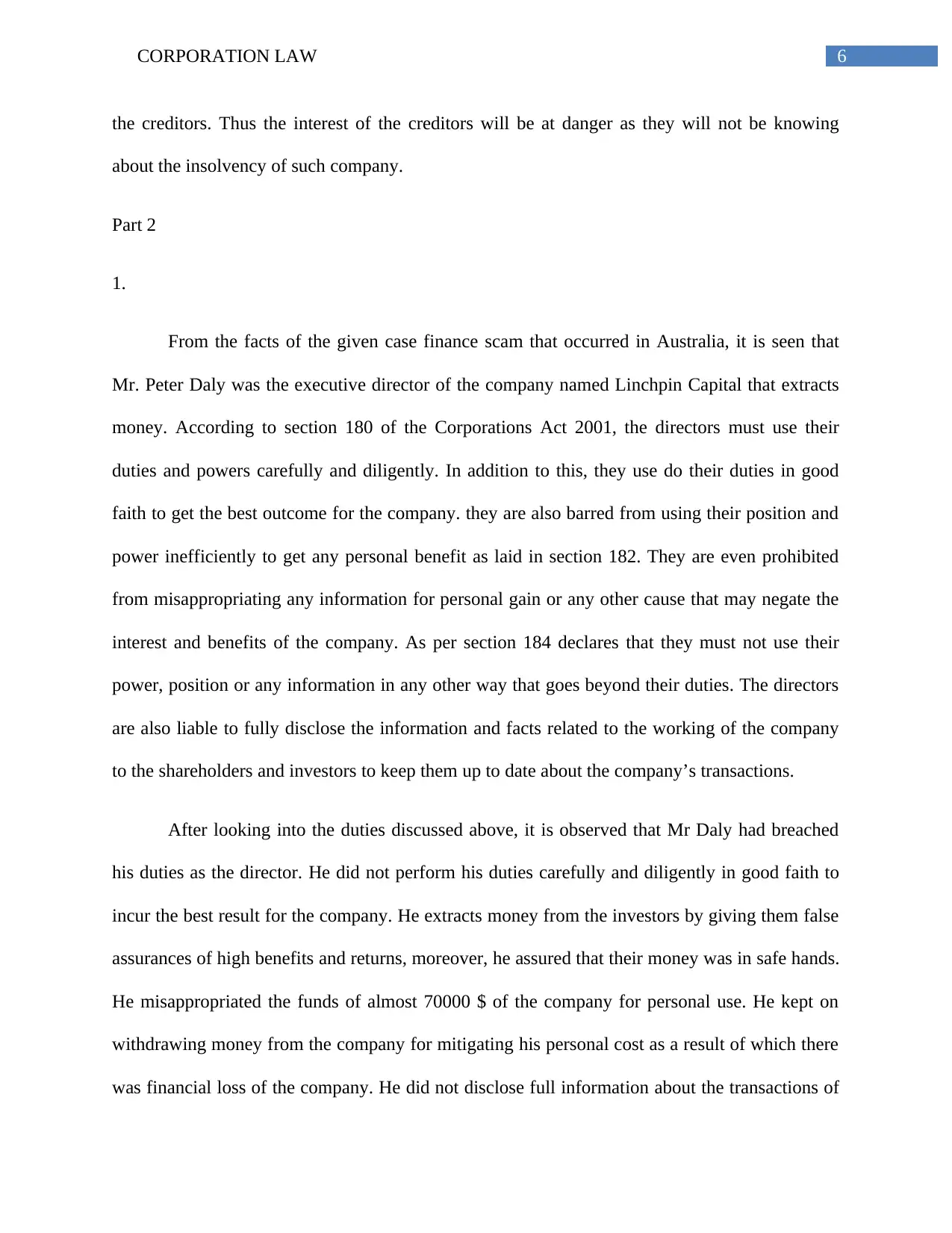
6CORPORATION LAW
the creditors. Thus the interest of the creditors will be at danger as they will not be knowing
about the insolvency of such company.
Part 2
1.
From the facts of the given case finance scam that occurred in Australia, it is seen that
Mr. Peter Daly was the executive director of the company named Linchpin Capital that extracts
money. According to section 180 of the Corporations Act 2001, the directors must use their
duties and powers carefully and diligently. In addition to this, they use do their duties in good
faith to get the best outcome for the company. they are also barred from using their position and
power inefficiently to get any personal benefit as laid in section 182. They are even prohibited
from misappropriating any information for personal gain or any other cause that may negate the
interest and benefits of the company. As per section 184 declares that they must not use their
power, position or any information in any other way that goes beyond their duties. The directors
are also liable to fully disclose the information and facts related to the working of the company
to the shareholders and investors to keep them up to date about the company’s transactions.
After looking into the duties discussed above, it is observed that Mr Daly had breached
his duties as the director. He did not perform his duties carefully and diligently in good faith to
incur the best result for the company. He extracts money from the investors by giving them false
assurances of high benefits and returns, moreover, he assured that their money was in safe hands.
He misappropriated the funds of almost 70000 $ of the company for personal use. He kept on
withdrawing money from the company for mitigating his personal cost as a result of which there
was financial loss of the company. He did not disclose full information about the transactions of
the creditors. Thus the interest of the creditors will be at danger as they will not be knowing
about the insolvency of such company.
Part 2
1.
From the facts of the given case finance scam that occurred in Australia, it is seen that
Mr. Peter Daly was the executive director of the company named Linchpin Capital that extracts
money. According to section 180 of the Corporations Act 2001, the directors must use their
duties and powers carefully and diligently. In addition to this, they use do their duties in good
faith to get the best outcome for the company. they are also barred from using their position and
power inefficiently to get any personal benefit as laid in section 182. They are even prohibited
from misappropriating any information for personal gain or any other cause that may negate the
interest and benefits of the company. As per section 184 declares that they must not use their
power, position or any information in any other way that goes beyond their duties. The directors
are also liable to fully disclose the information and facts related to the working of the company
to the shareholders and investors to keep them up to date about the company’s transactions.
After looking into the duties discussed above, it is observed that Mr Daly had breached
his duties as the director. He did not perform his duties carefully and diligently in good faith to
incur the best result for the company. He extracts money from the investors by giving them false
assurances of high benefits and returns, moreover, he assured that their money was in safe hands.
He misappropriated the funds of almost 70000 $ of the company for personal use. He kept on
withdrawing money from the company for mitigating his personal cost as a result of which there
was financial loss of the company. He did not disclose full information about the transactions of
Paraphrase This Document
Need a fresh take? Get an instant paraphrase of this document with our AI Paraphraser
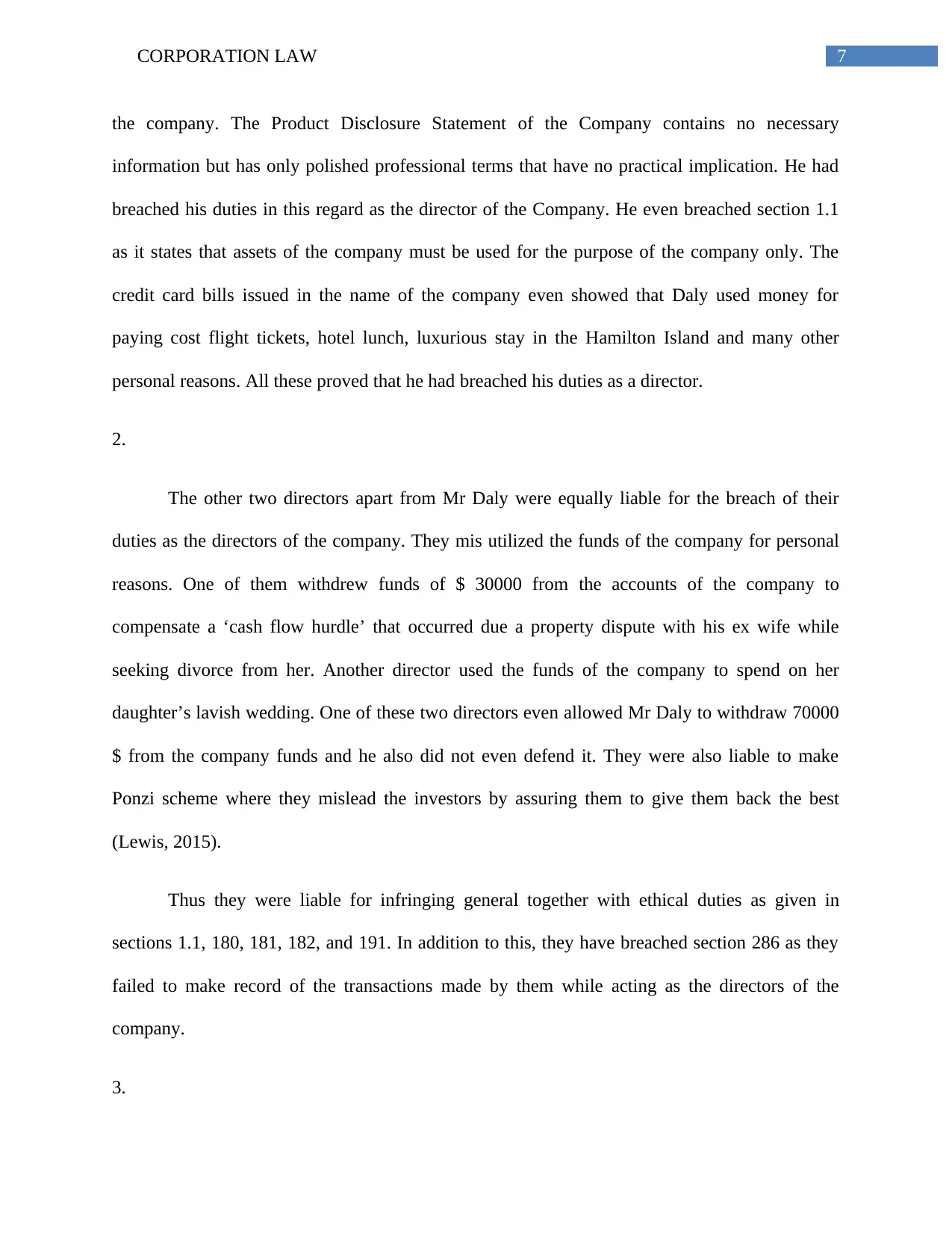
7CORPORATION LAW
the company. The Product Disclosure Statement of the Company contains no necessary
information but has only polished professional terms that have no practical implication. He had
breached his duties in this regard as the director of the Company. He even breached section 1.1
as it states that assets of the company must be used for the purpose of the company only. The
credit card bills issued in the name of the company even showed that Daly used money for
paying cost flight tickets, hotel lunch, luxurious stay in the Hamilton Island and many other
personal reasons. All these proved that he had breached his duties as a director.
2.
The other two directors apart from Mr Daly were equally liable for the breach of their
duties as the directors of the company. They mis utilized the funds of the company for personal
reasons. One of them withdrew funds of $ 30000 from the accounts of the company to
compensate a ‘cash flow hurdle’ that occurred due a property dispute with his ex wife while
seeking divorce from her. Another director used the funds of the company to spend on her
daughter’s lavish wedding. One of these two directors even allowed Mr Daly to withdraw 70000
$ from the company funds and he also did not even defend it. They were also liable to make
Ponzi scheme where they mislead the investors by assuring them to give them back the best
(Lewis, 2015).
Thus they were liable for infringing general together with ethical duties as given in
sections 1.1, 180, 181, 182, and 191. In addition to this, they have breached section 286 as they
failed to make record of the transactions made by them while acting as the directors of the
company.
3.
the company. The Product Disclosure Statement of the Company contains no necessary
information but has only polished professional terms that have no practical implication. He had
breached his duties in this regard as the director of the Company. He even breached section 1.1
as it states that assets of the company must be used for the purpose of the company only. The
credit card bills issued in the name of the company even showed that Daly used money for
paying cost flight tickets, hotel lunch, luxurious stay in the Hamilton Island and many other
personal reasons. All these proved that he had breached his duties as a director.
2.
The other two directors apart from Mr Daly were equally liable for the breach of their
duties as the directors of the company. They mis utilized the funds of the company for personal
reasons. One of them withdrew funds of $ 30000 from the accounts of the company to
compensate a ‘cash flow hurdle’ that occurred due a property dispute with his ex wife while
seeking divorce from her. Another director used the funds of the company to spend on her
daughter’s lavish wedding. One of these two directors even allowed Mr Daly to withdraw 70000
$ from the company funds and he also did not even defend it. They were also liable to make
Ponzi scheme where they mislead the investors by assuring them to give them back the best
(Lewis, 2015).
Thus they were liable for infringing general together with ethical duties as given in
sections 1.1, 180, 181, 182, and 191. In addition to this, they have breached section 286 as they
failed to make record of the transactions made by them while acting as the directors of the
company.
3.
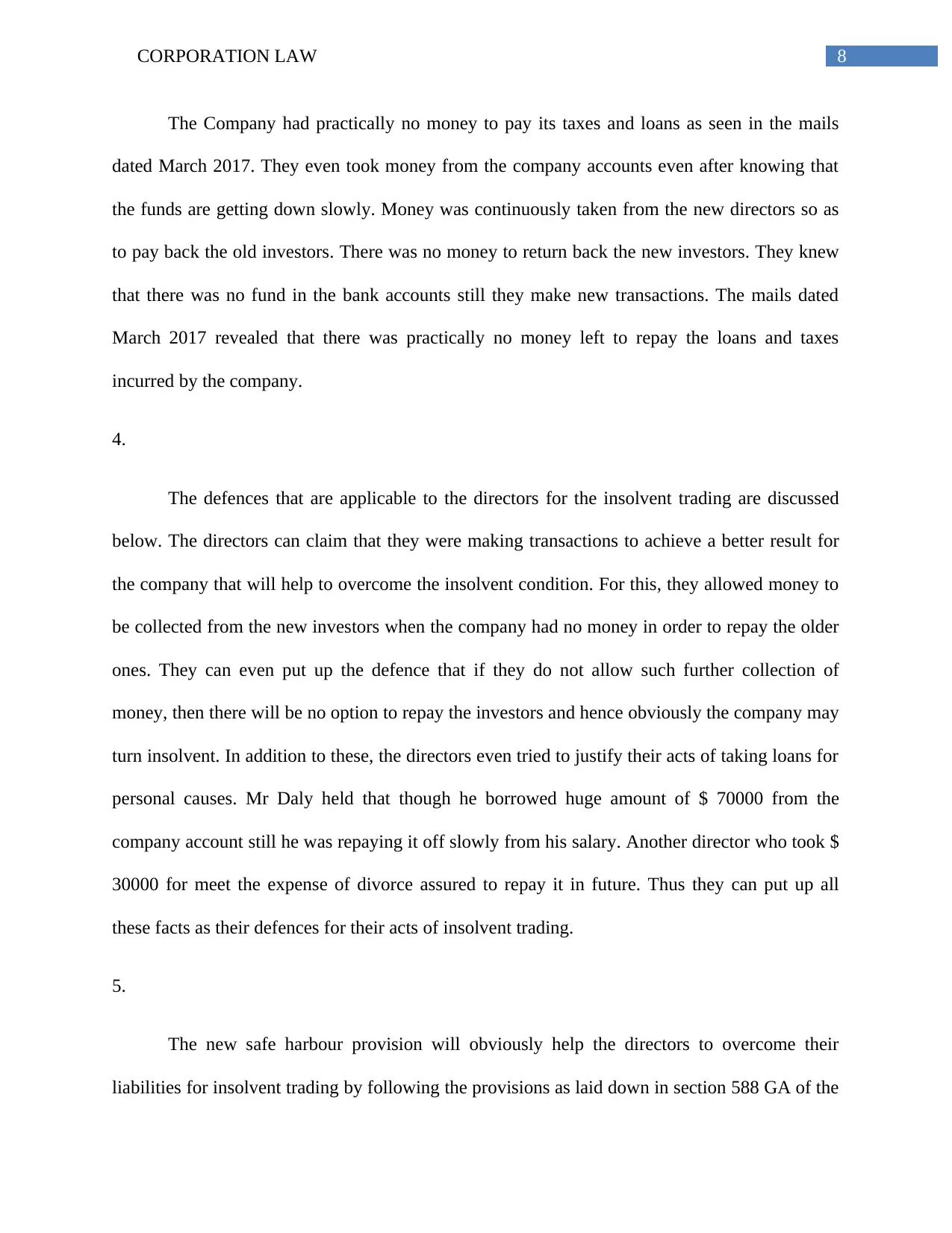
8CORPORATION LAW
The Company had practically no money to pay its taxes and loans as seen in the mails
dated March 2017. They even took money from the company accounts even after knowing that
the funds are getting down slowly. Money was continuously taken from the new directors so as
to pay back the old investors. There was no money to return back the new investors. They knew
that there was no fund in the bank accounts still they make new transactions. The mails dated
March 2017 revealed that there was practically no money left to repay the loans and taxes
incurred by the company.
4.
The defences that are applicable to the directors for the insolvent trading are discussed
below. The directors can claim that they were making transactions to achieve a better result for
the company that will help to overcome the insolvent condition. For this, they allowed money to
be collected from the new investors when the company had no money in order to repay the older
ones. They can even put up the defence that if they do not allow such further collection of
money, then there will be no option to repay the investors and hence obviously the company may
turn insolvent. In addition to these, the directors even tried to justify their acts of taking loans for
personal causes. Mr Daly held that though he borrowed huge amount of $ 70000 from the
company account still he was repaying it off slowly from his salary. Another director who took $
30000 for meet the expense of divorce assured to repay it in future. Thus they can put up all
these facts as their defences for their acts of insolvent trading.
5.
The new safe harbour provision will obviously help the directors to overcome their
liabilities for insolvent trading by following the provisions as laid down in section 588 GA of the
The Company had practically no money to pay its taxes and loans as seen in the mails
dated March 2017. They even took money from the company accounts even after knowing that
the funds are getting down slowly. Money was continuously taken from the new directors so as
to pay back the old investors. There was no money to return back the new investors. They knew
that there was no fund in the bank accounts still they make new transactions. The mails dated
March 2017 revealed that there was practically no money left to repay the loans and taxes
incurred by the company.
4.
The defences that are applicable to the directors for the insolvent trading are discussed
below. The directors can claim that they were making transactions to achieve a better result for
the company that will help to overcome the insolvent condition. For this, they allowed money to
be collected from the new investors when the company had no money in order to repay the older
ones. They can even put up the defence that if they do not allow such further collection of
money, then there will be no option to repay the investors and hence obviously the company may
turn insolvent. In addition to these, the directors even tried to justify their acts of taking loans for
personal causes. Mr Daly held that though he borrowed huge amount of $ 70000 from the
company account still he was repaying it off slowly from his salary. Another director who took $
30000 for meet the expense of divorce assured to repay it in future. Thus they can put up all
these facts as their defences for their acts of insolvent trading.
5.
The new safe harbour provision will obviously help the directors to overcome their
liabilities for insolvent trading by following the provisions as laid down in section 588 GA of the
⊘ This is a preview!⊘
Do you want full access?
Subscribe today to unlock all pages.

Trusted by 1+ million students worldwide
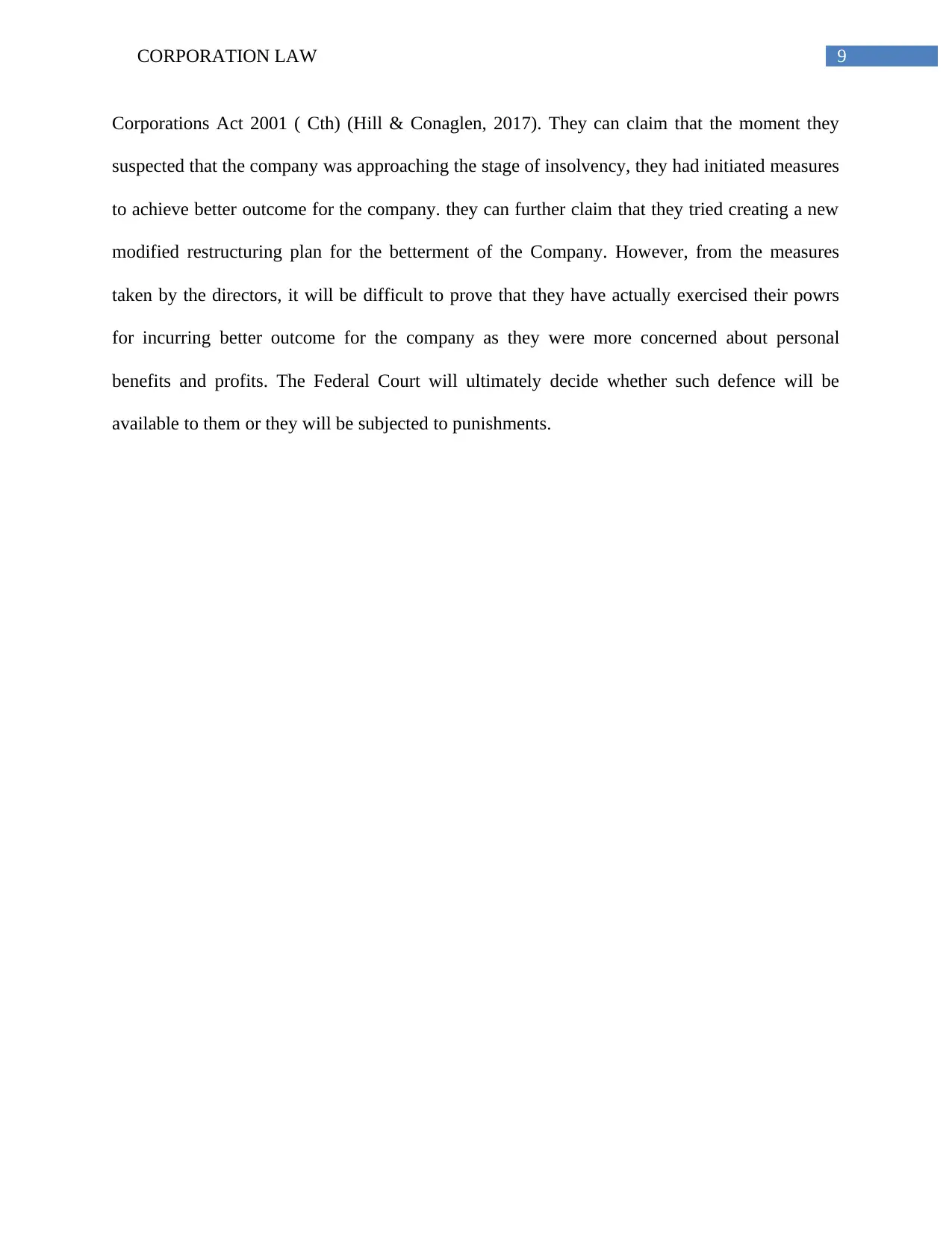
9CORPORATION LAW
Corporations Act 2001 ( Cth) (Hill & Conaglen, 2017). They can claim that the moment they
suspected that the company was approaching the stage of insolvency, they had initiated measures
to achieve better outcome for the company. they can further claim that they tried creating a new
modified restructuring plan for the betterment of the Company. However, from the measures
taken by the directors, it will be difficult to prove that they have actually exercised their powrs
for incurring better outcome for the company as they were more concerned about personal
benefits and profits. The Federal Court will ultimately decide whether such defence will be
available to them or they will be subjected to punishments.
Corporations Act 2001 ( Cth) (Hill & Conaglen, 2017). They can claim that the moment they
suspected that the company was approaching the stage of insolvency, they had initiated measures
to achieve better outcome for the company. they can further claim that they tried creating a new
modified restructuring plan for the betterment of the Company. However, from the measures
taken by the directors, it will be difficult to prove that they have actually exercised their powrs
for incurring better outcome for the company as they were more concerned about personal
benefits and profits. The Federal Court will ultimately decide whether such defence will be
available to them or they will be subjected to punishments.
Paraphrase This Document
Need a fresh take? Get an instant paraphrase of this document with our AI Paraphraser
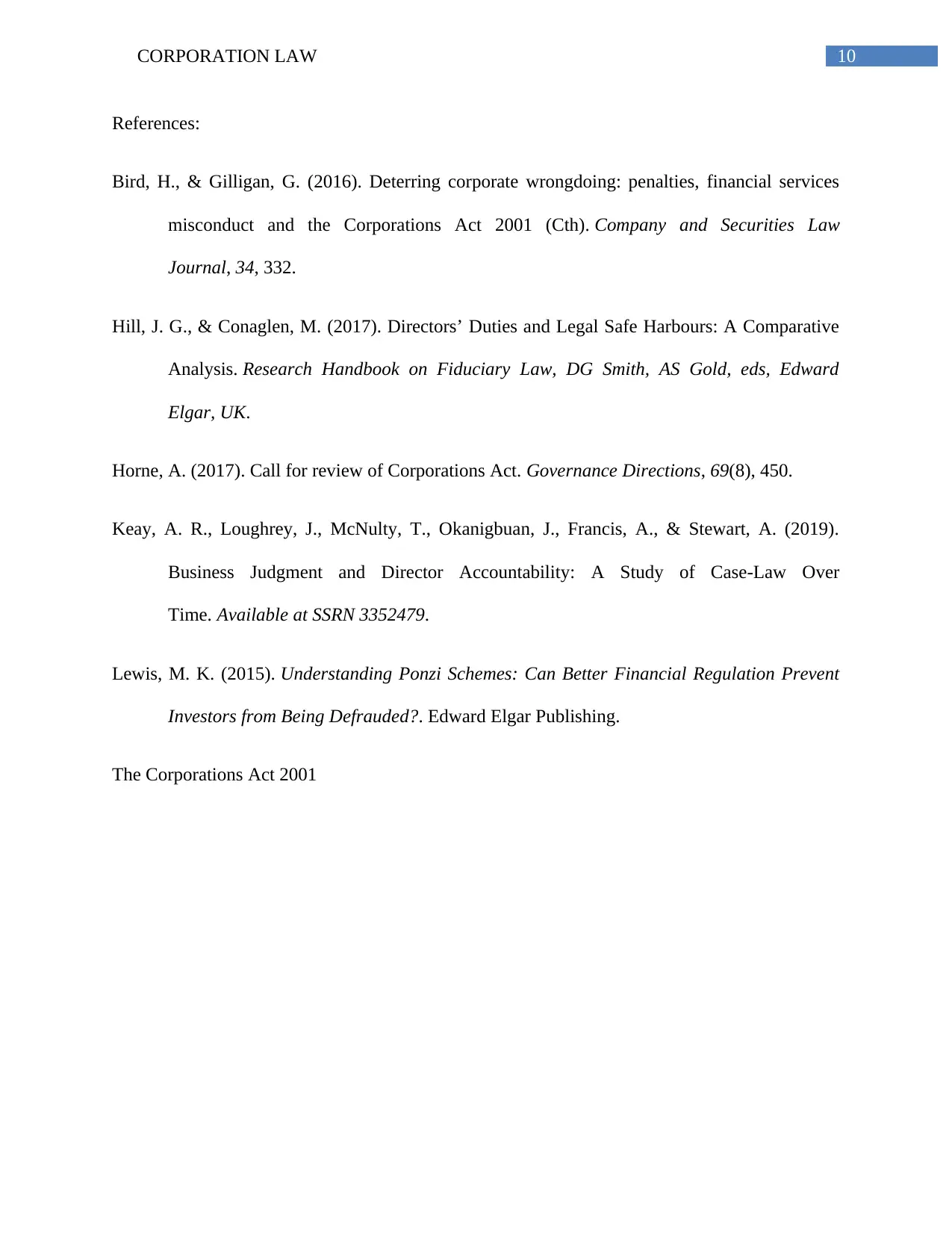
10CORPORATION LAW
References:
Bird, H., & Gilligan, G. (2016). Deterring corporate wrongdoing: penalties, financial services
misconduct and the Corporations Act 2001 (Cth). Company and Securities Law
Journal, 34, 332.
Hill, J. G., & Conaglen, M. (2017). Directors’ Duties and Legal Safe Harbours: A Comparative
Analysis. Research Handbook on Fiduciary Law, DG Smith, AS Gold, eds, Edward
Elgar, UK.
Horne, A. (2017). Call for review of Corporations Act. Governance Directions, 69(8), 450.
Keay, A. R., Loughrey, J., McNulty, T., Okanigbuan, J., Francis, A., & Stewart, A. (2019).
Business Judgment and Director Accountability: A Study of Case-Law Over
Time. Available at SSRN 3352479.
Lewis, M. K. (2015). Understanding Ponzi Schemes: Can Better Financial Regulation Prevent
Investors from Being Defrauded?. Edward Elgar Publishing.
The Corporations Act 2001
References:
Bird, H., & Gilligan, G. (2016). Deterring corporate wrongdoing: penalties, financial services
misconduct and the Corporations Act 2001 (Cth). Company and Securities Law
Journal, 34, 332.
Hill, J. G., & Conaglen, M. (2017). Directors’ Duties and Legal Safe Harbours: A Comparative
Analysis. Research Handbook on Fiduciary Law, DG Smith, AS Gold, eds, Edward
Elgar, UK.
Horne, A. (2017). Call for review of Corporations Act. Governance Directions, 69(8), 450.
Keay, A. R., Loughrey, J., McNulty, T., Okanigbuan, J., Francis, A., & Stewart, A. (2019).
Business Judgment and Director Accountability: A Study of Case-Law Over
Time. Available at SSRN 3352479.
Lewis, M. K. (2015). Understanding Ponzi Schemes: Can Better Financial Regulation Prevent
Investors from Being Defrauded?. Edward Elgar Publishing.
The Corporations Act 2001
1 out of 11
Related Documents
Your All-in-One AI-Powered Toolkit for Academic Success.
+13062052269
info@desklib.com
Available 24*7 on WhatsApp / Email
![[object Object]](/_next/static/media/star-bottom.7253800d.svg)
Unlock your academic potential
Copyright © 2020–2026 A2Z Services. All Rights Reserved. Developed and managed by ZUCOL.





